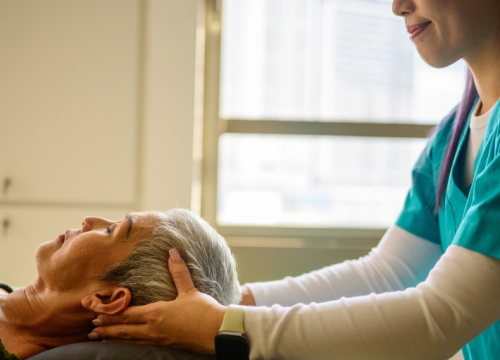Building Well-Being Practices into Everyday Life with Parkinson’s

Parkinson’s disease (PD) affects everyone differently and changes over time. Symptoms can be hard to predict and may fluctuate depending on factors like medication, stress and sleep. The pressure to adapt to changing physical abilities, as well as mood symptoms, such as depression, anxiety and apathy, may be overwhelming at times and lead to feelings of hopelessness. Whether you feel this way and are searching for a way forward or just looking to boost your overall well-being, there are everyday strategies that can help.
Below we highlight ways to feel more fulfilled, foster healthy habits and build empowerment and resiliency — all of which can help you adapt to the challenges of life with PD and improve quality of life.
1. Find what is important.
For most, meaning in life comes from a combination of connection with others, hobbies, spirituality and work. Parkinson's can cause people to withdraw from meaningful activities and lose those connections — especially if getting to places or doing the things you love are becoming more difficult. This can create a sense of loneliness or even make life feel meaningless.
The first step in restoring meaning is to look at what matters most in life and what you enjoy. For some people, it’s spending time with friends or family or giving back to meaningful causes. Try to:
- Carve out time to think about what you value.
- Take a break from screens and social media to clear your head.
- Focus on spending time with people or experiences that lift you up.
- Start small — focus on little things every day that can add joy and meaning to your life.
2. Pave the way to healthy habits.
Working gradually to create healthy routines around exercise, diet, sleep, medications and connection with others can help with quality of life. Work towards integrating these healthy habits into your routine:
-
Exercise regularly to help you move and feel better.
-
Eat a healthy, balanced diet that can provide energy and ease symptoms.
-
Create a consistent sleep schedule to give your body the time it needs to repair.
-
Take medications at the same times every day to help keep symptoms under control.
-
Schedule daily touchpoints with friends and family to stay connected and engaged.
Convert health goals into routines in 3 steps:
- Develop a cue or trigger that prompts you to do the behavior. For instance, leave your exercise clothes out at night to motivate you to exercise in the morning.
- Repeat the behavior until it becomes automatic. Be patient — it can take up to three months to form a new habit.
- Identify rewards that reinforce the behavior.
New habits often take extra effort and planning to take hold — especially if the behavior doesn’t come naturally to you. For some people with PD, forming new habits can be tricky since dopamine — a key part of the reward system — declines over time. Finding ways to cue new behaviors can remind you to stick to your goals. For example, plan to attend a new work out class with a buddy to stay on track.
For help identifying personal goals and any barriers getting in the way of forming healthy habits, consider cognitive behavioral therapy, a type of counseling that focuses on replacing negative thought patterns with positive ones.
3. Believe in yourself.
You are in charge of your health and well-being. Studies show that believing in your ability to tackle life’s challenges may improve mental and physical health. This belief makes it more likely that you will pursue a goal, put in extra effort to accomplish it and stick with it, even if there are setbacks.
When experiencing self-doubt, let others inspire you. Read books or watch movies about people in similar circumstances and how they coped with their challenges. Reach out to a local Parkinson’s Foundation chapter or your neurologist's office to help find a support group that works for you.
You can also inspire yourself by remembering everything you have accomplished and overcome in the past. People are often more resilient than they believe. Most importantly, give yourself grace — coming up short from time to time is part of being human.
4. Identify obstacles.
Up to 50% of people with PD will experience some form of depression, while up to 40% will experience an anxiety disorder. Caring for mental health and building emotional resiliency requires addressing PD mood changes — some of which require medication and talk therapy (psychotherapy).
Discuss treatment options with your doctor and look for a counselor or therapist if excessive worry or sadness, lack of motivation or other mood changes begin to interfere with daily life.
If you are trying to get back to an activity you love, write down your goals. What obstacles are getting in your way? Is there a way to simplify or modify an activity? For example, if you love baking but are struggling to follow a complex recipe, try getting out all the ingredients at the start and then putting away each ingredient as you use it. An occupational therapist can help you adapt your environment or find new ways to keep doing the things you enjoy.
5. Take a team approach.
Whether you have lived with Parkinson’s two years or 10, building a support team can help you live better. When possible, seek expert care and rely on different types of experts to address your needs as they arise. A neurologist, speech-language pathologist, physical and occupational therapist, counselor and other healthcare professionals can offer comprehensive care. Contact the Parkinson's Foundation Helpline at 1-800-4PD-INFO (1-800-473-4636) to find professionals in your community.
Don’t limit your teambuilding to those who care for your health. Living with the challenges of Parkinson’s usually requires an “all hands on deck” approach. Look to your closest connections — people who are invested in the outcome of what you're doing — for emotional support. Connect with others also living with PD, whether in person or online, to unite with people that understand your journey on a personal level.
Helpful Resources
The Parkinson’s Foundation is here for you. Explore our mental wellness resources now:
Learn More
Explore all of the topics in our PD Health @ Home Mental Wellness Series.
Related Blog Posts


Start 2026 Strong: Simple Resolutions for Better Health
